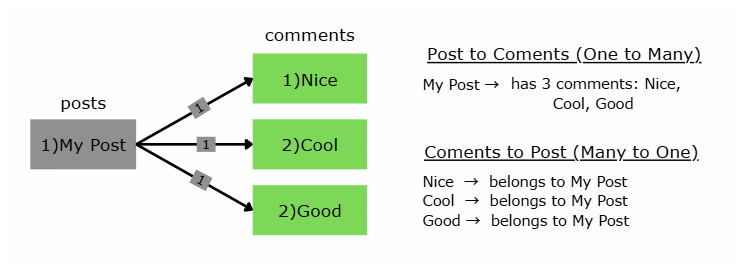Laravel
Laravel Basic
Laravel Form
Laravel Database
Laravel Advance
One To Many & Many To One
What is One To Many?
- Definition: One record in a table can have multiple related records in another table.
- Example:
- One Post → can have many Comments.
- (A blog post can receive many comments from users.)
Post → Comments
What is Many To One?
- Definition: The reverse of One To Many.
- Example:
- Many Comments → belong to One Post.
- (Each comment is always related to one specific post.)
Comments → Post
Flow diagram

Migration:
Use this command to generate a migration for creating a tables:
php artisan make:migration create_onetomany_manytoone_tables
Migration File
public function up(): void
{
Schema::create('posts', function (Blueprint $table) {
$table->id();
$table->string('title');
$table->timestamps();
});
Schema::create('comments', function (Blueprint $table) {
$table->id();
$table->foreignId('post_id')->constrained()->onDelete('cascade');
$table->string('body');
$table->timestamps();
});
}
public function down(): void
{
Schema::dropIfExists('comments');
Schema::dropIfExists('posts');
}
Run Migration
php artisan migrate
Tables
posts table
| id | title | created_at | updated_at |
|---|
comments table
| id | post_id | body | created_at | updated_at |
|---|
post_id is the foreign key connecting Comments → Posts.
Model:
Generate a model with Artisan:
php artisan make:model Post php artisan make:model Comment
This generates 2 files Post.php and Comment.php
Post.php
namespace App\Models;
use App\Models\Comment;
use Illuminate\Database\Eloquent\Model;
class Post extends Model
{
protected $fillable = ['title'];
// One Post has Many Comments
public function comments()
{
return $this->hasMany(Comment::class);
}
}
Comment.php
namespace App\Models;
use App\Models\Post;
use Illuminate\Database\Eloquent\Model;
class Comment extends Model
{
protected $fillable = ['post_id', 'body'];
// Each Comment belongs to One Post
public function post()
{
return $this->belongsTo(Post::class);
}
}
CRUD Examples
Create
use App\Models\Post; // Create a Post $post = Post::create(['title' => 'My Post']); // Add Comments to that Post $post->comments()->create(['body' => 'Nice']); $post->comments()->create(['body' => 'Cool']); $post->comments()->create(['body' => 'Good']); // Method 2 Using Eloquent instance $post2= new Post(); $post2->title= "My Second Post"; $post2->save(); // Add Comments to that Post $post2->comments()->create(['body' => 'This is Greate']); $post2->comments()->create(['body' => 'Thank you.']);
Output:
posts table
| id | title | created_at | updated_at |
|---|---|---|---|
| 1 | My Post | 2025-08-17 20:38:58 | 2025-08-17 20:38:58 |
| 2 | My Second Post | 2025-08-17 20:38:58 | 2025-08-17 20:38:58 |
comments table
| id | post_id | body | created_at | updated_at |
|---|---|---|---|---|
| 1 | 1 | Nice | 2025-08-17 20:38:58 | 2025-08-17 20:38:58 |
| 2 | 1 | Cool | 2025-08-17 20:38:58 | 2025-08-17 20:38:58 |
| 3 | 1 | Good | 2025-08-17 20:38:58 | 2025-08-17 20:38:58 |
| 4 | 2 | This is Greate | 2025-08-17 20:38:58 | 2025-08-17 20:38:58 |
| 5 | 2 | Thank you. | 2025-08-17 20:38:58 | 2025-08-17 20:38:58 |
👉 Here, post_id is automatically set in the comments.
Read
use App\Models\Post;
use App\Models\Comment;
// Get all comments for a post
$post = Post::find(1);
foreach ($post->comments as $comment) {
echo $comment->body;
}
// Get the post for a specific comment
$comment = Comment::find(1);
echo $comment->post->title; // "My Post"
Update
use App\Models\Post; use App\Models\Comment; // Update a comment $comment = Comment::find(1); $comment->body = "Updated comment text"; $comment->save(); // Update post and its comments $post = Post::find(1); $post->title = "Updated Post Title"; $post->save();
Delete
use App\Models\Post; use App\Models\Comment; // Delete a single comment Comment::find(1)->delete(); // Delete a post → all its comments will also be deleted (cascade) Post::find(2)->delete();
Eager loading (optimizes queries)
use App\Models\Post;
use App\Models\Comment;
// Get all comments for a post
$post = Post::with('comments')->find(1);
foreach ($post->comments as $comment) {
echo $comment->body;
}
// Get the post for a specific comment
$comment = Comment::with('post')->find(1);
echo $comment->post->title; // "My First Post"
Always use with() when fetching related data in bulk.
Whereisstuff is simple learing platform for beginer to advance level to improve there skills in technologies.we will provide all material free of cost.you can write a code in runkit workspace and we provide some extrac features also, you agree to have read and accepted our terms of use, cookie and privacy policy.
© Copyright 2024 www.whereisstuff.com. All rights reserved. Developed by whereisstuff Tech.